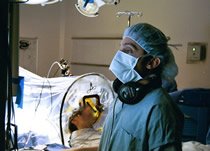Advertisment
Deep Brain Stimulation Surgery at University of Florida, USA

Deep Brain Stimulation Surgery
Deep Brain Stimulation (DBS), lesion surgery, and other new and innovative technologies are currently being used at UF to treat the symptoms of Parkinson’s Disease, essential tremor, dystonia, and other complex movement disorders and affective syndromes. The center is developing these techniques for anyone with a medical illness involving a group of brain structures known as the basal ganglia.
Deep Brain Stimulation Background
Many human central nervous system diseases are associated with abnormal patterns of physiologic activity in brain circuitry. One group of diseases involves abnormalities in a family of 5 parallel circuits which control both motor and non-motor functions. These circuits belong to a group of structures called the basal ganglia. Based on a plethora of animal and human research, we have learned that rates and patterns of electrophysiological activity are abnormal in many of these basal ganglia circuits. We can change the rates and patterns of activity by implanting brain stimulators into one of many targets including the thalamus, subthalamic nucleus, globus pallidus, internal capsule, nucleus accumbens, and other regions.
We can place these devices in an operating room setting utilizing advanced brain imaging, stereotactic targeting, microelectrode recording, and macrostimulation. The placement will often need to be within a millimeter or less of the optimal target to improve symptoms and avoid side effects. By applying electrical stimulation in these regions we can change the abnormal brain conversations and effectively treat many diseases including Parkinson’s, tremor, dystonia, and obsessive compulsive disorder. After placement the electrodes remain implanted and adjustments can be made to deep brain stimulation settings (pulse width, frequency, amplitude) for changes in symptoms over time.
Appropriately selected patients may benefit dramatically from deep brain stimulation therapy (DBS), or ablative procedures such as pallidotomy or thalamotomy. The UFMDC specializes in the surgical treatment of movement disorders, offering all currently available procedures, and they perform research directed at improving the delivery and efficacy of these surgical treatments. The operating room at the University of Florida is equipped with the finest instruments available including microelectrode recording, physiology, and imaging capabilities. The team at UF is one of the largest interdisciplinary teams offering advantages to patients for better selection, faster service, improved targeting, refined microelectrode mapping, and a full time dedicated DBS programming nurse and staff. UF’s program is supported by the National Institutes of Health.
For more information, go to http://mdc.mbi.ufl.edu and http://www.parkinson.org





